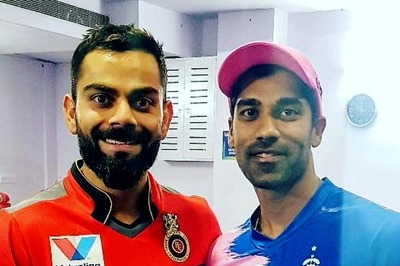
views
As a pioneer for women's boxing in India, Mary Kom is already an inspiration for many others who hope to follow in her footsteps. To see her weep on air while apologizing to the country for not winning an Olympic gold medal was one of the most endearing moments of India's campaign a the 2012 London Games.
The 29-year-old five-time world champion and mother of two marked her Olympic debut – it was the first time women's boxing was included in the Games – by winning bronze. It was a proud moment for Mary Kom and the country, but the Manipuri appeared distinctly unsatisfied with her achievement having spoken publicly about her dream of winning gold. It was, after all, her last chance to get the respect and appreciation her achievements deserve.
With boxing in the public eye after India won its first medal in boxing at the Beijing Olympics through Vijender Singh, there was plenty of hope from India's boxing contingent – seven men and Mary Kom. The mood was decidedly upbeat about India's boxing chances in London, with many scribes and pundits wagering that at least two medals could be won this year.
In the end, Mary Kom's was the only medal. Hardly the finish most expected from our boxers. Yes, several were undone by inconsistent judging which also left many other teams fuming and forced the International Boxing Association to suspend a couple of judges, but overall there was a feeling that India's boxers were still found wanting.
The youngest boxer in India's contingent, 18-year-old Shiva Thapa, entered the Games with plenty of expectation but failed to match up. It can be argued that at that tender age he was overwhelmed, but the manner in which Thapa was beaten by Mexico's Oscar Valdez Fierro as India's campaign began was indicative of the fact that our boxers still lack that killer instinct. Fierro won 14-9, leaving Thapa in shock. Such was his distress that he refused to speak after the loss.
Vijender, the former middleweight (75kg) world No. 1, lifted spirits by beating Danabek Suzhanov of Kazakhstan in his Round of 32 bout. And when Jai Bhagwan went past Seychelles' Andrique Allisop, it appeared India were on the way up.
But Sumit Sangwan's defeat in his opening bout and the rejection of India's subsequent appeal against the original decision adversely affected the contingent. Sangwan was narrowly defeated in his 81kg bout to Brazilian Yamaguchi Falcao Florentino, 15-14, and there was uproar in the Indian camp which felt Sangwan had played better and landed more punches on his opponent. Even the on-air commentators were shocked, with one even terming it "daylight robbery".
The next Indian pugilist to be ousted in was Jai Bhagwan in the round of 16, to Kazakhstan's Gani Zhailauov. Having taken the first round 3-2, Jai Bhagwan slacked in the second and third and was totally overpowered physically and mentally. His general lack of ideas was disappointing.
What really dented India's hopes was the controversial exit of Vikas Krishan, touted as a genuine medal contender. The positive result of his 69kg pre-quarterfinal boxing bout was overturned following a review by his American opponent, leaving Vikas shocked. The next to cry foul was Manoj Kumar (64kg) after he lost his pre-quarterfinal bout to Thomas Stalker of Great Britain 16-20. But watch that match again and you can see Manoj was clearly out-boxed.
Vijender and Devendro reached the quarterfinals of their respective categories but failed to progress. Each boxer was outpunched and outthought by their opponents. The difference in standard was evident. While individually these two boxers showed a competitive and combative spirit while being tactically sharp, the rest could not penetrate on a consistent basis. They were operating from the outside too much and not concentrating on straight, clear-cut punches. The new scoring rules, implemented in 2011, put emphasis on prominent punches instead of body hits of jabs. It was almost as if they were unaware of the new rules and still looking for combination punches which, per the new scoring system, have been rendered almost pointless. India's boxers needed to develop more infighting, but did not.
Poor judging was indeed a factor in India's performance. Sangwan was truly hard done and as Brigadier PK Muralidharan Raja, secretary-general of the Indian Amateur Boxing Federation, correctly pointed out in Vikas' case, the Indian pugilist had not been warned for holding by the referee so naturally he continued to do so. But this does not mask the overall feeling that India's male boxers were left wanting on many accounts, including fitness. If you are the fighter who landed the most effective punches in the match, then it is a good bet that you have also shown the best defense, ring generalship and effective aggression. This wasn't the case with India's pugilists.
While the men’s performance at London 2012 was disappointing, it was not a disaster. India can take heart the Games with the confidence that the future is bright. In 2016, should he qualify for the Rio de Janeiro Olympics, Thapa will be 22. Sangwan will be 23, Vikas and Devendro 24. Vijender is 26 so it's tough to see him at Rio 2016, but the aforementioned youngsters will be in their prime. India can look to the next Games with more confidence than they did before London.



















Comments
0 comment